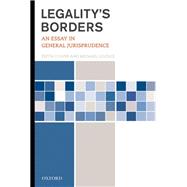
Note: Supplemental materials are not guaranteed with Rental or Used book purchases.
Purchase Benefits
Looking to rent a book? Rent Legality's Borders An Essay in General Jurisprudence [ISBN: 9780195370751] for the semester, quarter, and short term or search our site for other textbooks by Culver, Keith; Giudice, Michael. Renting a textbook can save you up to 90% from the cost of buying.
| Acknowledgments | p. xi |
| Introduction | p. xiii |
| Legal Officials, the Rule of Recognition and International Law | p. 1 |
| Structure and Function of the Rule of Recognition | p. 2 |
| Explaining Officials' Contribution to the Rule of Recognition: Facing Circularity and Indeterminacy | p. 6 |
| Officials by Office and Attitude | p. 7 |
| Speculative Social Anthropological Accounts | p. 10 |
| Herarch in the Rule of Recognition | p. 14 |
| The Rule of Recognition and International Law | p. 22 |
| Not a System but a set | p. 25 |
| International Rules of Change and Adjudication | p. 27 |
| International Legal Officials? | p. 32 |
| Kelsen's Account of International Law | p. 37 |
| The Hierarchical View of Legal System and Non-State Legality | p. 41 |
| Raz's Structural Account of Legality | p. 42 |
| Functional Assessment of Raz's Account of legality | p. 47 |
| Indeterminacy at the Borders | p. 47 |
| Parochialism | p. 54 |
| State-Centered Hierarchy | p. 62 |
| Non-State Legality | p. 65 |
| Hierarchy and the European Union | p. 66 |
| Trans-State Legality Revisited | p. 74 |
| Meta-Theorteical-Evaluative Motivations | p. 79 |
| Perspective, Phenomena, Problems, and Method | p. 80 |
| The Ordinary Person's Perspective and a Contingent Concept | p. 81 |
| Bootstrapping in Analytical Legal Theory | p. 88 |
| Recent Approaches to the Problem of Perspective | p. 94 |
| System and Set | p. 94 |
| Network Theory | p. 99 |
| International Relations Theory | p. 101 |
| Renewed Perspective | p. 104 |
| An Inter Institutional Theory | p. 111 |
| Elements of Legality | p. 114 |
| Content-Independent Peremptory Reasons for Action | p. 114 |
| Legal Normative Powers | p. 115 |
| Institutions of Law | p. 120 |
| Legal Institutions | p. 122 |
| Mutual Reference and Intensity | p. 124 |
| The Systemic Law-State | p. 129 |
| Minimum Content of Natural Law | p. 129 |
| Comprehensiveness, Supremacy, and Openness | p. 131 |
| System | p. 133 |
| The Narrative Concept of Law and the Problems of Circularity and Indeterminacy | p. 138 |
| An Inter-Institutional Account of Non-State Legality | p. 143 |
| Meta-Theory Revisited: Between Legal Pluralism and Geo-Centric Statism | p. 143 |
| Meeting the Explanatory Challenge: Bringing Elements of Legality to Bear on Explanatory Problems Beyond the Systemic Law-State | p. 148 |
| Inrra-State Legality | p. 149 |
| Trans-State Legality | p. 155 |
| Supra-State Legality | p. 160 |
| Super-State Legality | p. 169 |
| Fresh Problems | p. 173 |
| Pathologies of Legality | p. 175 |
| Novel Technologies and their Implications for Conceptions of Legality | p. 180 |
| Re-balance after Imbalance: Consequences of Re-socializing a Descriptive-Explanatory View of Law | p. 181 |
| Index | p. 185 |
| Table of Contents provided by Ingram. All Rights Reserved. |
The New copy of this book will include any supplemental materials advertised. Please check the title of the book to determine if it should include any access cards, study guides, lab manuals, CDs, etc.
The Used, Rental and eBook copies of this book are not guaranteed to include any supplemental materials. Typically, only the book itself is included. This is true even if the title states it includes any access cards, study guides, lab manuals, CDs, etc.